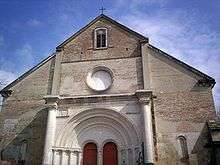Lescar Cathedral

Lescar Cathedral (Cathédrale Notre-Dame-de-l'Assomption de Lescar) is a Roman Catholic cathedral, and a national monument of France, located in the town of Lescar.
It was formerly the seat of the Diocese of Lescar, suppressed under the Concordat of 1801 and divided between the dioceses of Agen and Bayonne.
History and description
The building was begun in 1120 by Bishop Guy de Lons, and was sacked by the Protestants during the reign of Jeanne III of Navarre. It was restored in the 17th and 18th centuries. The apse, housing a pavement mosaic from the 12th century with hunting scenes, is in Romanesque style. In the interior, columns have capitals depicting histories of the life of Daniel, of the birth of Christ and the Sacrifice of Isaac.
Royal burials
From the end of the 15th century the cathedral was used as the burial place of the royal family of Navarre. Francis Phoebus was buried here in 1483, followed by Catherine of Navarre, her consort Jean d'Albret and several of their children, among them Henry II of Navarre and his wife Marguerite of Angoulême, grandparents of King Henry IV of France.
Of the funerary monuments ordered by Henry II, subjected to iconoclastic damage by Protestants and to the collapse of the sanctuary vault in 1599, nothing remains. Archaeological excavations in 1928-1929 were successful however in rediscovering the royal crypt and the remains of its occupants.[1]
Gallery
- View from the north-west
- Side view
- Capital
- 12th century mosaic
- Tomb of the kings of Navarre
- Statue of Saint Galactorius
References
- ↑ Victor Dubarat, "Découverte des tombeaux des rois de Navarre à Lescar", dans Revue d'histoire de l'Église de France, vol. 17, 1931, pp. 450-463
External links
| Wikimedia Commons has media related to Lescar Cathedral. |
Coordinates: 43°19′58″N 0°26′0″W / 43.33278°N 0.43333°W